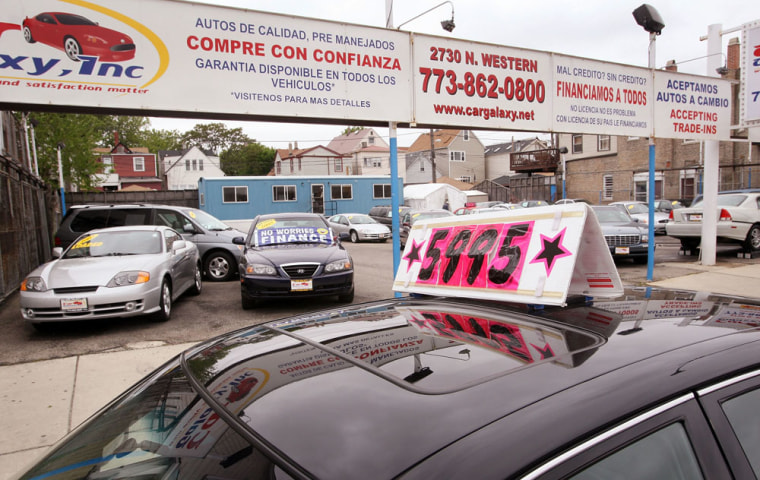Einstein may have been right when he said that compound interest is the most powerful force in the universe, but depreciation runs a strong second when buying a used car.
With gas prices hovering around $4 a gallon, consumers are giving used cars a closer look, and with good reason. According to the National Automobile Dealers Association, the average price of a used car sold by its member dealers last year was about $15,000, compared with $29,000 for new cars.
While it’s important to buy a used car with a reputation for solid dependability, it’s even smarter to buy a used car that is less popular with consumers, meaning it has depreciated more rapidly.
“The best new cars make the best used cars,” reads the slogan for Toyota’s certified pre-owned used-car program, and in general it is true. But Toyotas depreciate slowly. That makes them attractive as new cars but less appealing as used cars because they cost more than faster-depreciating brands.
The slowest-depreciating brands are Scion, Mini, BMW, Volkswagen and Honda, according to Kelly Blue Book, a vehicle information service.
Instead of those popular models, think about some other brands that get high scores for reliability but can save thousands over similar vehicles. Consider domestic brands like Chevrolet, Dodge and Ford. Sure, it’s good for the economy to buy American, but a more immediate benefit to you is that they depreciate faster than Hondas and Toyotas, meaning you will get a relative bargain.
For example, a 2006 Buick LaCrosse CX, listed among Consumer Reports’ most reliable cars for 2008, can be had for $13,900, according to Kelley Blue Book, compared with $19,250 for a 2006 Toyota Camry SE V6 would cost you.
Camrys make great cars, and as the company’s slogan promises they make great used cars. But does a Camry deliver $5,350 more transportation value than another four-door V-6 sedan that’s made by Buick? It seems unlikely.
And how about the value compared to a new car? The MSRP for a new Toyota Camry SE V-6 is $25,575. The 2006 Buick is still under its original warranty and probably in great shape (assuming you paid attention when shopping). It costs $11,675 less than a new Camry. That is how you can stretch your car-buying dollar during uncertain economic times.
Yes, new Hondas and Toyotas do well in comparison tests, and they cost around the same as domestic models when new. But when looking at used models, the domestics can cost thousands less for a very similar product, making them much more attractive.
Wary shoppers might point to this price difference as a reflection of the expected reliability of these cars, and that was true at one time.
But today it’s more a reflection of the fact that domestic manufacturers have overproduced to keep factories running because of labor agreements. The need to make new cars (whether or not they are wanted by customers) forces manufacturers to push them into the marketplace with incentives that depress the resale value of similar used cars.
Domestic manufacturers also dump a lot of their production into the marketplace by selling cars to rental agencies, which often resell them as used in a year or less, flooding the market with late-model used cars and further depressing resale values.
All of these factors work in the favor of the consumer who is able to buy a low-mileage, nearly new Chevrolet Impala or Malibu, Ford Taurus or Five Hundred, or Chrysler Sebring for barely more than half the price of a new car.
Other domestic sedans offer similar benefits. But if you have become conditioned to believe the only Japanese manufacturers build reliable cars, or if you just like them better, consider a Nissan or Mazda, which depreciate faster than Toyotas and Hondas.
The depreciation effect is especially strong in the premium brand segment, where Lincolns and Cadillacs cost pennies on the dollar as used cars, while Mercedes, BMW and Lexus cars hold their value well.
Consumer Reports routinely grades the domestic premium brands as among the most reliable cars, and J.D. Power and Associates says their dealers have some of the highest customer satisfaction scores. So if you want the longer warranty and friendly customer service of a premium brand, buying used can be a good move.
Buying used has also become much more like buying new thanks to dramatic improvements in the durability of new cars and a new emphasis on the sale of used cars by manufacturers and dealers.
Americans bought 50 million used cars last year, with major franchise dealers selling about a quarter of the total. A few years ago carmakers began certifying clean, low-mileage, late-model used cars. These cars provide many of the same benefits as new cars — they’re inspected, their worn parts like brakes and tires are replaced, and they are given a warranty in addition to any remaining factory warranty from when they were new.
Increased interest in used cars has fueled the rapid growth of CarMax, the no-haggle pricing used car superstore, which sold 377,000 cars last year through its 93 stores nationwide.
The Internet has had its usual transformative effect. Customers locate cars with just the features they want through CarMax or aggregator sites like Cars.com and AutoTrader.com.
Additionally, consumers can buy cars auctioned on eBay and posted for sale on Craigslist.
Members have sold 3 million cars to date using eBay Motors. Craigslist posted free ads for 3 million cars on its site in the last month alone, although the online classified service doesn’t track how many are sold. About one-quarter of the cars lists on Craigslist are posted by dealers.
Craigslist consumers can choose to look only at cars listed by dealers if they like the idea of buying from a company that can be expected to stand behind a sale, or they can look only at cars listed by individuals if they would rather do business one-on-one.
